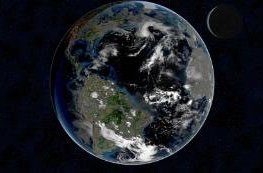
The Earth isn't as bright as it once was, scientists approve

- 4-10-2021, 21:45
INA - BAGHDAD
A new finding that seems a little out of this world is a new reality for researchers who have been studying the cosmos for the last two decades.
They discovered the Earth is not as bright as it once was and has been dimming at a noticeable pace in the last few years.
Using a telescope which does not look much different from the one you could have in your home, researchers from the Big Bear Solar Observatory have been taking measurements each night for the last 20 years, to study the sun's solar cycle and cloud cover.
They did this by measuring the "earthshine," which occurs when "the dark face of the Moon catches Earth's reflected glow and returns that light," according to NASA. The amount of earthshine will vary from night to night and season to season.
"You look at a quarter moon. You can see the whole moon because three quarters of it is illuminated in this ghostly light," said Philip Goode, a researcher at New Jersey Institute of Technology and the lead author of the new study.
After 20 years of measuring the 'ghostly light,' they found it to be fading.
"It's actually the sunlight reflected off the earth, and that's what's getting dimmer," said Goode.
In fact, the Earth is now reflecting about half a watt less light per square meter than it was 20 years ago, the equivalent of a 0.5% decrease in the Earth's reflectance. Earth reflects about 30% of the sunlight that shines on it.
"A lot of these things, you can surrender your common sense at the door and there are a lot of surprises," Goode said. "These are one of those surprises."
For the first 17 years, the data looked more or less the same, to the point where the researchers almost called off the rest of the study.
"We were sort of reluctant to do the last three years of data because it looked the same for 17 years, but finally we decided to do it because we promised ourselves 20 years of data so let's just do this, and we got the unexpected," said Goode.
In a shocking turn of events, the last three years of their study showed the earthshine had gone down dramatically. So much, they thought their data was flawed.
"When we analyzed the last three years of data, it looked different," Goode said. "The reflectance had gone down and had gone down noticeably. So we thought we had done something wrong. So we redid it several times and it turns out it was correct."
They noticed the data didn't correlate with the varying brightness of the sun due to its solar cycles, which meant the cause had to be something else.
What they noticed was a decrease in cloud cover. The sunlight is bounced off the cloud tops and reflected back into space. When there is a decrease in cloud cover, more sunlight is allowed in.
Duhok of Iraq and Qadsia of Kuwait match kicks off
- Sport
- 25/04/15
Four Daesh terrorists detained in Salahuddin
- Security
- 25/04/14
Two ISIS hideouts destroyed, killing those inside in Salah al-Din
- Security
- 25/04/13
Date Set for 'El Clasico' Final of the Copa del Rey
- Sport
- 25/04/12












